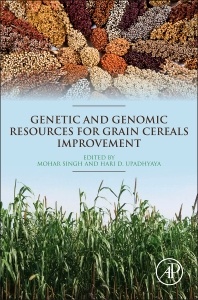Description
Genetic and Genomic Resources for Grain Cereals Improvement
Authors: Singh Mohar, Upadhyaya Hari D.
Language: English
Subjects for Genetic and Genomic Resources for Grain Cereals Improvement:
Keywords
Avena sativa; barley; barnyard millet; breeding; collection; conservation; contribution; diversity; evaluation; finger millet; foxtail millet; genetic erosion; genetic mapping; genetic resources; germplasm; germplasm conservation; germplasm evaluation; Hordeum species; kodo millet; little millet; oat; Oryza sativa; pearl millet; proso millet; rice; small millets; Sorghum bicolor; utilization; wheat; wide crosses
111.49 €
In Print (Delivery period: 14 days).
Add to cartSupport: Print on demand
Description
/li>Contents
/li>Readership
/li>Biography
/li>Comment
/li>
Genetic and Genomic Resources For Cereals Improvement is the first book to bring together the latest available genetic resources and genomics to facilitate the identification of specific germplasm, trait mapping, and allele mining that are needed to more effectively develop biotic and abiotic-stress-resistant grains.
As grain cereals, including rice, wheat, maize, barley, sorghum, and millets constitute the bulk of global diets, both of vegetarian and non-vegetarian, there is a greater need for further genetic improvement, breeding, and plant genetic resources to secure the future food supply.
This book is an invaluable resource for researchers, crop biologists, and students working with crop development and the changes in environmental climate that have had significant impact on crop production. It includes the latest information on tactics that ensure that environmentally robust genes and crops resilient to climate change are identified and preserved.
- Summary
- Introduction
- Origin, distribution and diversity including taxonomy/biosystematics
- Erosion of genetic diversity from the traditional areas
- Status of germplasm resources conservation (ex-situ/in-situ on farm)
- Germplasm evaluation and maintenance
- Use of germplasm in crop improvement
- Limitations in germplasm use
- Germplasm enhancement through wide crosses
- Integration of genomic and genetic resources in crop improvement
- Conclusions
- References
Cereal crop breeders, PGR researchers and crop biologists, advanced students
- Provides a single-volume resource on the global research work on grain cereals genetics and genomics
- Presents information for effectively managing and utilizing the genetic resources of this core food supply source
- Includes coverage of rice, wheat, maize, barley, sorghum, and pearl, finger and foxtail millets




